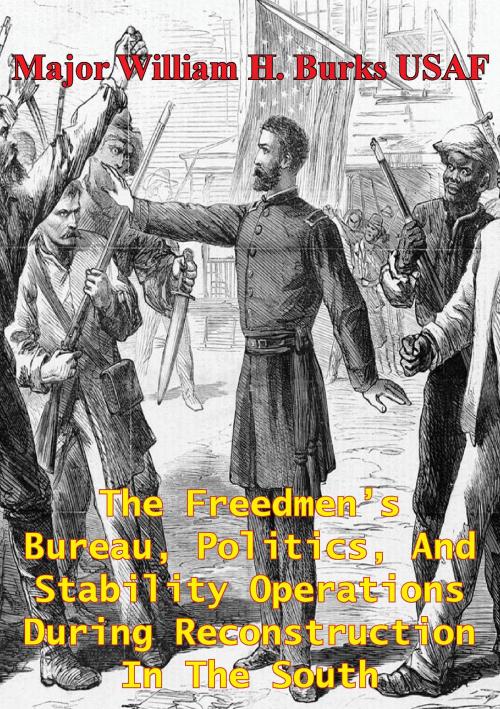The Freedmen’s Bureau, Politics, And Stability Operations During Reconstruction In The South
Nonfiction, History, Modern, 19th Century, Americas, United States, Civil War Period (1850-1877), Military| Author: | Major William H. Burks USAF | ISBN: | 9781782899297 |
| Publisher: | Golden Springs Publishing | Publication: | November 6, 2015 |
| Imprint: | Golden Springs Publishing | Language: | English |
| Author: | Major William H. Burks USAF |
| ISBN: | 9781782899297 |
| Publisher: | Golden Springs Publishing |
| Publication: | November 6, 2015 |
| Imprint: | Golden Springs Publishing |
| Language: | English |
The United States’ Civil War ended in 1865. However, the post-conflict period immediately following, known as Reconstruction, lasted another twelve years. This era provides a great case study to examine the impacts of politics on military stability operations. This paper studies the Freedmen’s Bureau during its existence from 1865 to 1872. Envisioned as the lead organization for integrating former slaves into American society, the Bureau’s efforts in the post-Civil War South were undermined by a hostile political situation at the national and state level and a diminishing lack of popular support throughout the entire nation to embrace radical social changes. The Bureau’s operational timeframe splits into three distinct periods: conflict with President Andrew Johnson from 1865 to early 1867, revamped efforts during Congressional Reconstruction from early 1867 to the end of 1868, and a reduced operational focus (primarily education) from 1869 to 1872. The Bureau faced manning challenges and fought racism as it worked to help former slaves become self-sufficient, educated, and true citizens of the nation in which they resided. Unfortunately, hostile political conditions meant much of the civil rights work accomplished by the Bureau was subdued after its demise until the Civil Rights Movement in the 1960s.
The United States’ Civil War ended in 1865. However, the post-conflict period immediately following, known as Reconstruction, lasted another twelve years. This era provides a great case study to examine the impacts of politics on military stability operations. This paper studies the Freedmen’s Bureau during its existence from 1865 to 1872. Envisioned as the lead organization for integrating former slaves into American society, the Bureau’s efforts in the post-Civil War South were undermined by a hostile political situation at the national and state level and a diminishing lack of popular support throughout the entire nation to embrace radical social changes. The Bureau’s operational timeframe splits into three distinct periods: conflict with President Andrew Johnson from 1865 to early 1867, revamped efforts during Congressional Reconstruction from early 1867 to the end of 1868, and a reduced operational focus (primarily education) from 1869 to 1872. The Bureau faced manning challenges and fought racism as it worked to help former slaves become self-sufficient, educated, and true citizens of the nation in which they resided. Unfortunately, hostile political conditions meant much of the civil rights work accomplished by the Bureau was subdued after its demise until the Civil Rights Movement in the 1960s.

![Cover of the book Staff Ride Guide - The Battle Of First Bull Run [Illustrated Edition] by Major William H. Burks USAF](https://www.kuoky.com/images/2014/august/300x300/9781782894599-MCut_300x.jpg)









![Cover of the book Transforming Under Fire: the Atlanta Campaign of 1864 [Illustrated Edition] by Major William H. Burks USAF](https://www.kuoky.com/images/2014/august/300x300/9781782893950-LgN5_300x.jpg)



